
Sir Charles Tupper, 1st Baronet, M.D. was a Canadian Father of Confederation who served as the sixth prime minister of Canada from May 1 to July 8, 1896. As the premier of Nova Scotia from 1864 to 1867, he led Nova Scotia into Confederation. He briefly served as the Canadian prime minister, from seven days after parliament had been dissolved, until he resigned on July 8, 1896, following his party's loss in the 1896 Canadian federal election. He is the only medical doctor to have ever held the office of prime minister of Canada and his 68-day tenure as prime minister is the shortest in Canadian history.

Sir Adams George Archibald was a Canadian lawyer and politician, and a Father of Confederation. He was based in Nova Scotia for most of his career, though he also served as first Lieutenant Governor of Manitoba from 1870 to 1872.

Daniel Duncan McKenzie, was a Canadian lawyer, judge, and politician.

The 1872 Canadian federal election was held from July 20 to October 12, 1872, to elect members of the House of Commons of Canada of the 2nd Parliament of Canada. Prime Minister Sir John A. Macdonald's Conservative Party remained in power, defeating the Liberals. However, the Liberals increased their parliamentary representation considerably, while the Conservative seat count remained static, giving them only six more seats than the Liberals. The election produced the country's first minority government. The support of two independent Conservative MPs functionally gave Macdonald an extremely slim majority that allowed it to survive for two years, until it fell due to scandal.
Antigonish was a federal electoral district in Nova Scotia, Canada, that was represented in the House of Commons of Canada from 1867 to 1917. It was created in the British North America Act, 1867. The federal riding was dissolved in 1914 into the riding of Antigonish—Guysborough. It consisted of the County of Antigonish.
Cape Breton was a federal electoral district in Nova Scotia, Canada, that was represented in the House of Commons of Canada from 1867 to 1904. It was created as part of the British North America Act, 1867.
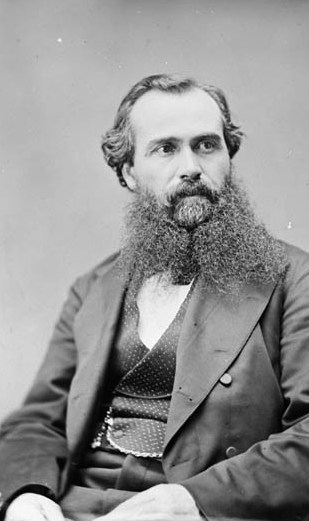
Hugh Macdonald, was a lawyer, judge and member of the First Canadian Parliament. He represented the Antigonish riding of Nova Scotia, from 1867 to 1869, along with William Hallett Ray, as an Anti-Confederate and, from 1869 to 1873, as a Liberal-Conservative.
Richmond was a federal electoral district in the province of Nova Scotia, Canada, that was represented in the House of Commons of Canada from 1867 to 1917. It was created by the British North America Act, 1867. It consisted of the County of Richmond. A law to abolish the riding was passed to merge it with Cape Breton South into Cape Breton South and Richmond in 1914. This was duly carried out when the first elections were held with new boundaries and the new name in 1917.
Victoria was a federal electoral district in Nova Scotia, Canada, that was represented in the House of Commons of Canada from 1867 to 1904. It was created by the British North America Act, 1867. It consisted of the County of Victoria. It was abolished in 1903 when it was merged into North Cape Breton and Victoria electoral district.
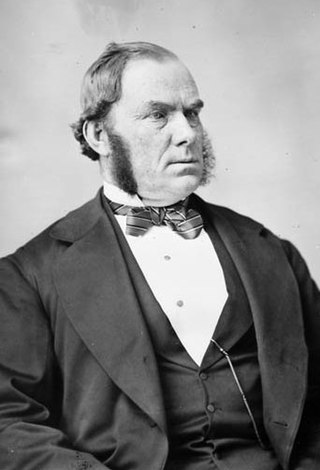
William Ross was a Canadian politician.
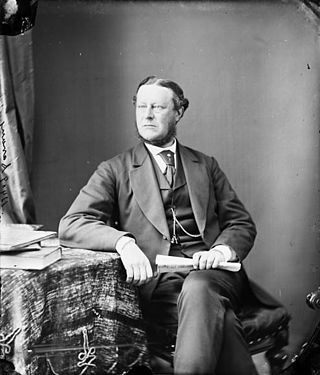
Alfred William Savary, served as a Nova Scotia member of the 1st Canadian Parliament for the Digby riding.

William McDonald was a Canadian politician.
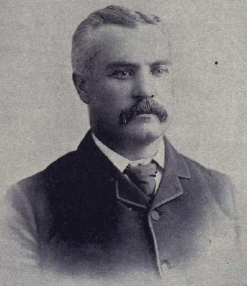
Joseph Alexander Gillies was a Canadian politician.

Newton LeGayet Mackay was a Canadian lawyer and political figure. He represented Cape Breton in the House of Commons of Canada from 1872 to 1878 as a Conservative and then Liberal member.

Murray Dodd was a lawyer, judge and political figure in Nova Scotia, Canada. He represented Cape Breton in the House of Commons of Canada from 1882 to 1887 as a Conservative member.
Charles James Campbell was a Scottish-born merchant and political figure in Nova Scotia, Canada. He represented Victoria in the House of Commons of Canada from 1874 to 1875, from 1876 to 1878 and from 1882 to 1887 as a Conservative member.
Finlay MacDonald was a Conservative member of the House of Commons of Canada. He was born in Port Hawkesbury, Nova Scotia and became a barrister.
Fenwick Lionel Kelly was a Liberal party member of the House of Commons of Canada. He was born in North Sydney, Nova Scotia and became a broker, farmer and merchant.
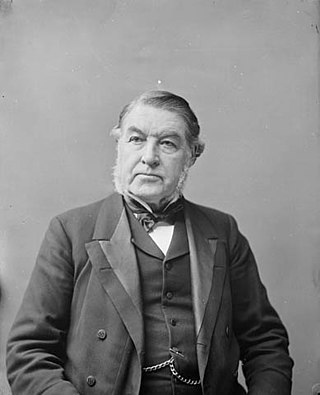
This article is the Electoral history of Sir Charles Tupper, the sixth Prime Minister of Canada. A Conservative, he became prime minister upon the resignation of Prime Minister Sir Mackenzie Bowell over the Manitoba Schools Question in 1896. Tupper was the shortest-serving prime minister, with a term of only 69 days. He led his party in two general elections and lost both, to Sir Wilfrid Laurier











